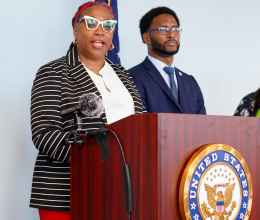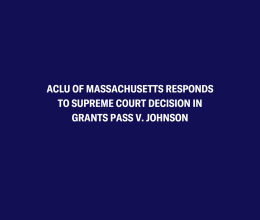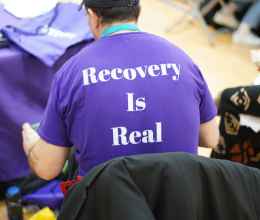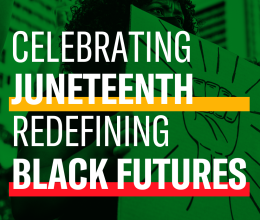Question 4: Legalizing marijuana is good for public health and social justice
The following piece was written by ACLU of Massachusetts executive director Carol Rose for WBUR’s Cognoscenti.
When thinking about how to cast your ballot on Question 4, to legalize, tax and regulate marijuana, consider the social justice implications of your vote.
Don’t buy the argument that "no one gets arrested for possession of marijuana” anymore. That’s simply not true. More than 600 people are still arrested for marijuana possession annually in Massachusetts. It matters a lot to them and their families that using pot is still not legal. Arrests generate criminal records, which create barriers to housing, employment, education, adoption and more.
Black people are more than three times more likely to be arrested for marijuana possession than whites, even though rates of marijuana use are the same across race.
Moreover, criminalizing marijuana disproportionately hurts poor people and folks of color. Black people are more than three times more likely to be arrested for marijuana possession than whites, even though rates of marijuana use are the same across race. Recent data from the Boston Police Department show that hundreds of people in Boston’s neighborhoods of color are disproportionately stopped by the police for marijuana, while their white suburban neighbors who consume at the same rate do so without concern. Indeed, since voters approved decriminalization of an ounce or less in 2008, racial disparities in marijuana arrests have increased in Massachusetts. Legalization will reduce those disparities. ...
The marijuana business already exists, it’s just in the shadows where exploitation takes place. It is time to bring the underground economy into the light, where we can regulate it and address it as a public health matter, with education and controls. Remember the "Let's make smoking history" education campaign? That did far more than prohibition to make once-ubiquitous cigarettes uncool.
We can’t wait for the legislature to fix the law. They have had multiple opportunities to do so and failed to act. Despite widespread calls for public health approaches to substance abuse, most politicians still fear being labeled “soft on crime” at reelection time.
Criminalizing marijuana has failed, because criminal law is too blunt a cudgel for an issue that calls for a public health education approach. A yes vote on Question 4 is a vote for public health and social justice.
To read the full article, please click here. To learn more about Question 4, visit aclum.org/question4.
Related content
APHA v. NIH
April 24, 2025
Federal Court Grants Preliminary Injunction Against Department of...
April 24, 2025Researchers Challenge NIH’s Politically Driven Grant Cancellations
April 2, 2025ACLU and NEA Sue U.S. Department of Education Over Unlawful Attack...
March 5, 2025
ACLU of Massachusetts statement on recommendations to reinforce...
October 16, 2024
ACLU of Massachusetts responds to Supreme Court decision in Grants...
June 28, 2024
Massachusetts for Overdose Prevention Centers comment on new VT law...
June 18, 2024